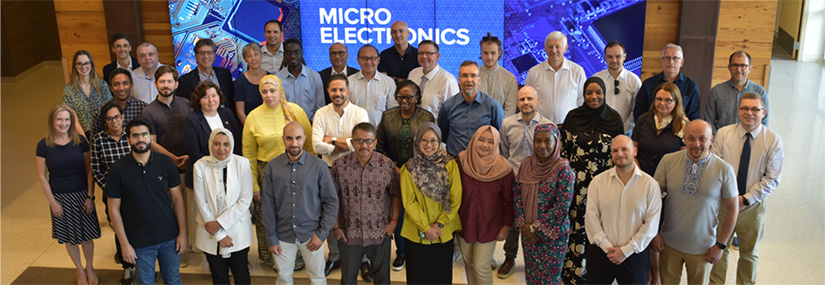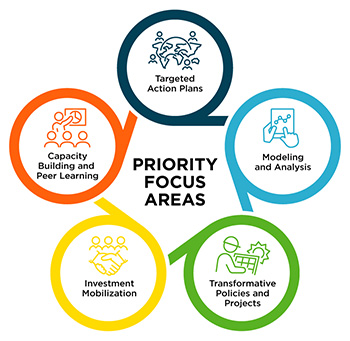Multi-Laboratory Collaborations for Advanced Global Energy Systems
NLR collaborates with other U.S. Department of Energy (DOE) national laboratories to provide technical analysis and planning support for countries developing energy system strategies.

NLR is part of a multi-national laboratory team that supports countries in achieving their energy goals. This work involves deep technical collaboration to accelerate country-specific objectives while ensuring energy security and resilience. Much of this work takes the form of developing energy roadmaps, implementing specific measures, and piloting new projects.
By bringing together expertise from across the national laboratories, the team provides technical analysis, capacity building, and knowledge sharing to support country energy planning efforts. These cross-laboratory collaborations provide technical support for energy project assessment and development.
Capabilities
NLR leverages a range of expertise in partnership with other national laboratories to accelerate country-driven energy plans:

- Technical expertise and modeling: Developing tailored modeling tools, data analysis, and energy roadmaps, including resource assessments, as well as grid integration and modernization strategies
- Project design and demonstration: Providing technical support for pilot project design and feasibility analysis, such as microgrids and distributed energy systems
- Capacity building and training: Providing technical training, workshops, and peer-to-peer learning for local energy professionals.
Featured Work

Workforce in Chile
Chile is advancing its workforce and economic opportunities alongside the development of advanced energy systems. A multi-laboratory team conducted an analysis of workforce and economic opportunities in Tocopilla, Chile, including those in industries besides energy. The team collaborated with key stakeholders and fostered a Sister City relationship between Lawrence, Kansas, and Tocopilla to facilitate information exchanges between Tocopilla and other U.S. cities undergoing similar energy transitions.
Related Publications
Leadership and Community Engagement in Chile, NLR Technical Report (2024)

Hybrid Minigrids in Indonesia
Hybrid minigrids—small-scale energy systems that integrate various power sources to deliver electricity to specific areas—present promising opportunities in Indonesia, where many remote islands lack access to a centralized power grid and rely on costly diesel generators. A cross-laboratory team is partnering with Texas-based TQ Automation to conduct feasibility studies for these hybrid minigrids. This work supports energy resilience, affordability, and local economic development in isolated regions of Indonesia.
Related Publication
Cost Benefit Analysis for Indonesia Buildings Sector: Whole Building Cooling Solutions, Argonne National Laboratory Technical Report (2024)

Methane Capture in Nigeria
Nigeria is interested in opportunities to implement and commercialize methane capture from oil and gas operations. The multi-laboratory team is partnering with oil and gas companies in Nigeria on three activities:
- Providing training and technical assistance on monitoring methane byproducts
- Delivery of technical assistance on methods for methane capture and commercial use
- Review of opportunities for the Nigerian government to strengthen guidelines on methane monitoring, capture, and commercial use.
Benefits of a Multi-Laboratory Approach
A multi-national laboratory approach offers significant benefits in supporting partner countries to achieve their energy goals by fostering collaboration, knowledge exchange, and the deployment of advanced technologies. NLR and other DOE national laboratories have worked together to support Argentina, Chile, Egypt, Indonesia, Nigeria, Singapore, Thailand, and Ukraine.
Through these collaborations, partner countries gain access to cutting-edge energy modeling, technical expertise, and tailored support for implementing advanced energy technologies. Learn more about NLR’s work in countries in:
Contact
Share
Last Updated Jan. 29, 2026
